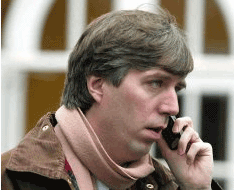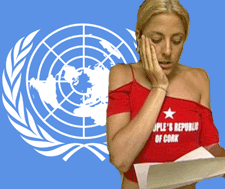UN Report: No Human Rights in Cork
7th Dec 2007
UN Report: No Human Rights in Cork aka Turlough Delaney's Guide to Cork
 |
The
map of Cork according to Turlough Delaney |
A United Nations report published on Monday, the People's Republic of Cork was ranked last on a list of countries based on their adherence to human rights. Other nations with a well-documented history of human rights abuse, including Indonesia, Turkmenistan, Sudan, The Vatican and China, all featured above the PROC on this new list. General Secretary of the UN Human Rights Council Jan Van De Heffelumpf was unequivocal in his condemnation of Cork's record. "This is Cork's first appearance in a UN report on human rights because it has been only in the last two years that United Nations representatives have been granted passage across her borders." For many, this report is only confirmation of something that has been well known for sometime - that Cork's adherence to human rights and basic political freedoms is non-existent, and it has been this way for the best part of a century. There is little or no free press in the PROC. All media is strictly state controlled, with all it's content divided between exalting 'the great Corkonian Republic' and demonising 'the pernicious Dublin regime' which seeks 'to undermine Cork and her people at every opportunity.' Cork people also live in fear of the country's brutal secret police - the Special House of Accumulating Data and Encouraging Solidarity (S.H.A.D.E.S.). According to Van De Heffelumpf: "The government has nurtured within the country a culture of deep paranoia and suspicion. Every economic and political setback is blamed on the machinations of the Irish Republic." Conspiracy theories are rife that Dublin agents have infiltrated PROC government, and some go as far as saying that Cork is actually ruled by treacherous quislings who sit in Irish parliament as TDs.
 |
An
example of a Delaney |
This, of course, is mere disinformation spread by the SHADES, mostly as a pretext to arrest various dissidents, Travellers and ethnic Irish minorities - hundreds of whom are sent every year to the notorious 'Gulag' prison camps in the barren Skibereenian region of south-western Cork. This deep antipathy among Cork people towards Ireland, and Dublin in particular, stems from the fact that Cork was once part of greater Ireland. Its eventual independence was born out of the failed assassination attempt on Michael Collins during the Irish Civil War, at Béal Na Bláth, 22 August 1922. A patriotic Corkman, Collins was convinced it was elements within the government back in Dublin (of which he was Chairman at the time) that were behind the attempt on his life. Collins sense of betrayal was such that he never left Cork's borders after that day. From his bunker in Cork City he quickly went about forming an independent government, disassociating himself from the ongoing Civil War in Ireland. FIRST CORK REPUBLIC The First Cork Republic was officially declared on the 29 February 1924 with Collins himself appointed as 'President For-Ever'. He then began a reign of terror that saw him successfully consolidate his control over the region during those turbulent early years. Collins remained in power up to his death from syphilitic obesity in 1964. Then began a power struggle within the regime, which was eventually won out by famous Cork hurler and staunch republican Jack 'the Tunnel' Lynch. He officially became President in 1966. But it was soon clear that his style of despotism was very different from that of Collins. Within two years he had all but dismantled the Republic. On August 15, 1968 Lynch had himself crowned King of the newly declared Celtic Royaldom of Cork. Under this new monarchy, democracy received as much elbowroom, if not less, than it did under his predecessor.
 |
| Michael Collins: kept the shuttle going while Neil and Buzz went for a walk. |
THE SECOND REPUBLIC Lynch remained King up until the 1990s and was eventually deposed in a coup in 1997. He died in prison in two years later. Soon after his removal, the Second Republic was established, this time with no single leader possessing absolute power. Officially named the People's Republic of Cork, it was to be governed by the mysterious Ruling Council, none whose members are known to anybody, or even how many sit on this council, if it exists at all. It is this kind of secrecy and unaccountability which has earned Cork it's low standing on the UN list. As Van De Heffelumpf says, "The Ruling Council has as much respect for human rights as did those monsters Collins and Lynch. The SHADES are by far the most repressive police force in Western Europe, leaving the Garda Síochána a distant second." However, many anti-PROC Cork ex-pats hope to drum up international support in toppling the current regime and replace it with a British-style constitutional monarchy. They look to Cork's uncrowned king-in exile Roy Keane to head this possible government.
 |
UN
report: sure we're all morto |
But according to Van De Heffelumpf, the Keanite proposal is unlikely to be recognised by the UN. "We want to democratise Cork. That's unlikely to happen if we help establish a man with well known tendancies towards violence, paranoia, megalomania, not to mention a deep-seated persecution complex." Michael 'Big Mick' Collins The title 'President For-Ever' that Michael Collins gave himself was the first sign that there would be little room for democracy during his reign. Indeed, in one of the most famous quotes attributed to him, he likened Cork people "to errant and unruly daughters, who must always be smacked into accepting what's good for them, yet you love them anyway because they are so beautiful." In 1937, in response to the McQuaid/De Valera constitution in Ireland, Collins introduced a 500-word sacred oath to be recited by all Cork people before every daily meal. Among other things, the oath stated that the speaker's "genitalia would shrivel up and fall off should (he or she) speak ill of Cork or its ruling government." It also said that the President "was such a virtuous man that every Cork family would be honoured for their daughter to receive his seed." He also famously had Guinness banned, making Murphy's the official drink of the CROC (Celtic Royaldom of Cork), where it would be available in all schools, churches and public places. This precipitated the appearance of underground 'stout-houses' across the state, which continued to sell Guinness illegally to outsiders.
--------------------------------------------------------------------------------
Turlough Delaney is a non-Corkonian who is part of the National Anti-Cork Knowledge & Education Reform (NACKER) committee that specialises in the mis-education of citizens of the Irish Republic with particular emphasis on playing down the natural superiority of Corkonians, their notions of independence and Roy Keane. Click here to view the cult's website.







